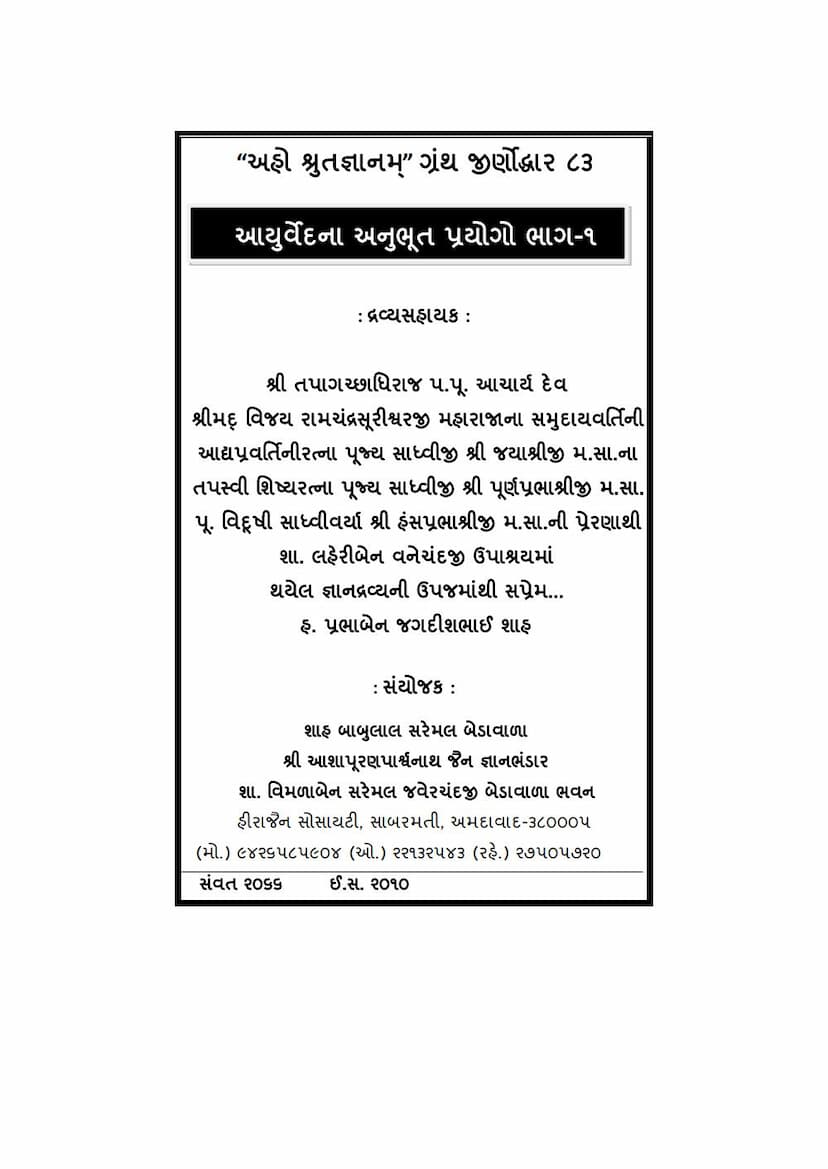Ayurvedna Anubhut Prayogo Part 01
Added to library: September 1, 2025

Summary
Here's a comprehensive summary of the Jain text "Ayurvedna Anubhut Prayogo Part 01" based on the provided pages:
Book Title: Ayurvedna Anubhut Prayogo Part 01 (Ayurvedic Experienced Practices, Part 01) Author: Kantisagar Publisher: Balabhai Lalabhai Makwana Catalog Link: https://jainqq.org/explore/034348/1
This book, "Ayurvedna Anubhut Prayogo Part 01," is a compilation of Ayurvedic remedies and practices, likely drawn from traditional knowledge and personal experiences. The preface highlights the paramount importance of health (Ayurveda) in ancient Indian culture, emphasizing that well-being is crucial for individual and societal progress. It suggests that ancient Rishis and Munis, living in harmony with nature, deeply understood health principles, contributing to a thriving civilization.
The text emphasizes that the understanding of Ayurveda is not limited to ancient scriptures but also encompasses regional and traditional knowledge passed down through generations. The preface laments the limited accessibility and proper utilization of such valuable, often locally developed, Ayurvedic practices. It argues for the recognition and preservation of these "field-tested" methods, which often provide effective and affordable treatments, even in cases where classical Ayurveda might fall short.
Key Themes and Content:
- Health as a Foundation: The book underscores the intrinsic human desire for health and longevity, stating that a healthy populace is the bedrock of a progressive society and civilization.
- Holistic Approach: It touches upon the interconnectedness of physical health with spiritual and philosophical development, noting that ancient Indian thinkers integrated health principles into their broader ethical and spiritual frameworks.
- Nature's Role: The preface acknowledges the significant role of nature and natural beauty in human well-being and mental development.
- Jain Contributions to Ayurveda: A significant portion of the introductory material (pages 15-26) discusses the involvement of Jain Acharyas and Munis in the development and practice of Ayurveda. It highlights their contributions through:
- Creation of Original Literature: Jain scholars authored independent works based on their research and experiences.
- Translation and Commentary: They translated and commented on major Ayurvedic texts, making them accessible to a wider audience.
- Compilation of Practices: A key contribution mentioned is the meticulous compilation of various remedies, especially practical and easily available ones, often noting the source or the practitioner.
- Emphasis on Ahimsa (Non-violence): The Jain emphasis on non-violence is seen as directly influencing their approach to Ayurveda, leading to a focus on plant-based and mineral-based treatments, largely avoiding animal-derived medicines.
- Integration into Daily Life: Jain Acharyas made Ayurvedic principles integral to their teachings on Dharma and conduct, indirectly promoting healthy lifestyles.
- Historical Context: The text briefly touches upon the historical evolution of Ayurveda, acknowledging efforts by various scholars to establish its chronological development but also pointing out the need to include regional contributions.
- The "Aho Shrutgyanam Granth Jurnoddhar" Project: The catalog links and page numbering indicate that this book is part of a larger initiative by the "Shri Ashapuran Parshvanath Jain Gyan Bhandar" to digitize and preserve rare and ancient Jain and related texts. "Ayurvedna Anubhut Prayogo Part 01" is listed among many other valuable works on various subjects like scriptures, logic, architecture, astrology, and literature.
- Compilation of Remedies (Content Breakdown): The later pages (28 onwards) provide a detailed index and the actual Ayurvedic practices. These remedies cover a vast range of ailments, categorized systematically, including:
- Head and Nervous System: Headaches (various types), neurological issues, sleep disorders.
- Sensory Organs: Eye ailments (cataract, vision problems, infections), ear problems (infections, wax), nasal issues (bleeding, congestion).
- Oral Health: Mouth ulcers, bad breath, tooth decay and pain.
- Respiratory and Digestive System: Cough, cold, phlegm, asthma, indigestion, gas, abdominal pain, piles, diarrhea, constipation.
- Skin Conditions: Boils, acne, itching, various types of skin diseases including leprosy and psoriasis.
- Urinary and Reproductive System: Urinary tract infections, stones, impotency, issues related to menstruation, conception, and pregnancy.
- Skeletal and Muscular System: Joint pain, swelling, fractures, paralysis.
- Poisoning and Snake Bites: Remedies for various types of poison, including snake bites and scorpion stings.
- Specific Preparations: The book details the preparation of oils, powders, decoctions, and pastes.
- Practicality and Accessibility: A recurring emphasis is placed on the practicality of the remedies, often using readily available herbs and ingredients. The text also notes the efficacy of these practices, many of which have been personally experienced or passed down through specific lineages.
- Dedication: The book is dedicated to Shri Narsinh Jijibhai Brahmbhatt of Palitana, acknowledging his contributions to Jainism and his support for the compiler, Muni Kantisagar.
In essence, "Ayurvedna Anubhut Prayogo Part 01" serves as a valuable resource for traditional and experiential Ayurvedic treatments, showcasing the rich heritage of health practices, with a significant emphasis on the contributions of Jain scholars to this field. It aims to make this knowledge accessible and applicable for the well-being of individuals.